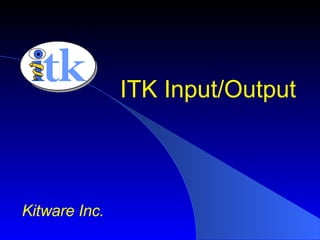
ITK Tutorial Presentation Slides-948
- 1. ITK Input/Output Kitware Inc.
- 4. Why do we need a Factory? How many file formats can you list? … (and many more exist…)
- 5. Supported file formats 2D Only - JPEG (.jpg/.jpeg) - Bitmap (.bmp) - PNG (.png) 2D/3D - Analyze 3.5 - GIPL (.gipl) - RAW (.raw) - DICOM - GE 4x,5x - IPLCommon - MetaImage (.mha/.mhd) - Siemens - Stimulate - TIFF - VTKImage - NRRD - LSM - NIFTI
- 6. How does the Factory work? reading JPEGImageIO TIFFImageIO DICOMImageIO AnalyzeImageIO Image Filename itk::Image Image IO Factory … Can you read this file?
- 7. How does the Factory work? writing JPEGImageIO TIFFImageIO DICOMImageIO AnalyzeImageIO Image Filename itk::Image Image IO Factory … Can you write this file?
- 9. Reading my first image #include <itkImageFileReader.h> typedef unsigned char PixelType; typedef itk::Image<PixelType, 2> ImageType ; itk::ImageFileReader< ImageType > ::Pointer reader = itk::ImageFileReader< ImageType > ::New(); reader->SetFileName (“ lena.jpg ”); try { reader->Update() ; } catch (itk::ExceptionObject & e) { std::cerr << e.GetDescription() << std::endl; return EXIT_FAILURE; } ImageType::Pointer image = reader->GetOutput() ;
- 10. Writing my first image #include <itkImageFileWriter.h> typedef unsigned char PixelType; typedef itk::Image<PixelType, 2> ImageType ; itk::ImageFileWriter< ImageType > ::Pointer writer = itk::ImageFileWriter< ImageType > ::New(); writer->SetFileName (“ lena.jpg ”); writer->SetInput (image); try { writer- >Update(); } catch (itk::ExceptionObject & e) { std::cerr << e.GetDescription() << std::endl; return EXIT_FAILURE; }
- 11. My file format converter itk::ImageFileReader< ImageType > ::Pointer reader = itk::ImageFileReader< ImageType > ::New(); itk::ImageFileWriter< ImageType > ::Pointer writer = itk::ImageFileWriter< ImageType > ::New(); reader ->SetFileName(“myImage. jpg ”) writer->SetFileName (“myImage .tiff ”); writer->SetInput ( reader->GetOutput() ); try { writer- >Update(); } catch (itk::ExceptionObject & e) { std::cerr << e.GetDescription() << std::endl; return EXIT_FAILURE; }
- 13. Reading RAW images #include <itkRawImageIO.h> itk::RawImageIO<unsigned short,2>::Pointer io ; io = itk::RawImageIO<unsigned short,2>::New(); io ->SetFileName(“myimage .raw ”); unsigned int dim[2] = {800,60}; double spacing[2] = {0.8, 0.8}; double origin[2] = {0.0,0.0}; for(unsigned int i=0; i<2; i++) { io -> SetDimensions (i,dim[i]); io -> SetSpacing (i,spacing[i]); io -> SetOrigin (i,origin[i]); } io -> SetHeaderSize (0); io -> SetByteOrderToLittleEndian (); io -> SetPixelType (itk::ImageIOBase::SCALAR); io -> SetNumberOfComponents (1);
- 14. Reading RAW images (2) itk::ImageFileReader< ImageType > ::Pointer reader = itk::ImageFileReader< ImageType > ::New(); reader ->SetFileName(“myImage. raw ”); reader ->SetImageIO( io ); try { reader->Update(); } catch (itk::ExceptionObject & e) { std::cerr << e.GetDescription() << std::endl; return EXIT_FAILURE; }
- 17. Reading DICOM images // Select the correct files from the directory typedef itk::ImageSeriesReader < ImageType > ReaderType; ReaderType::Pointer reader = ReaderType::New(); typedef itk::GDCMSeriesFileNames NamesGeneratorType; NamesGeneratorType::Pointer nameGenerator = NamesGeneratorType::New(); nameGenerator ->SetUseSeriesDetails( true ); nameGenerator->SetDirectory ( “./MyDirectory/” ); typedef std::vector< std::string > FileNamesContainer; FileNamesContainer fileNames; fileNames = nameGenerator->GetFileNames( seriesIdentifier ); reader->SetFileNames ( fileNames ); // Set the DicomIO typedef itk::GDCMImageIO ImageIOType; ImageIOType::Pointer dicomIO = ImageIOType::New(); reader->SetImageIO ( dicomIO ); reader->Update();
- 19. Metadata
- 24. Write Transform Example #include "itkTransformFileWriter.h” #include "itkAffineTransform.h” typedef itk::AffineTransform<double,3> AffineTransformType; AffineTransformType::Pointer affine = AffineTransformType::New(); itk::TransformFileWriter::Pointer writer ; writer = itk::TransformFileWriter::New(); writer->AddTransform ( affine ); writer->SetFileName ( “AffineTransform.txt" ); try { writer->Update() ; } catch( itk::ExceptionObject & excp ) { std::cerr << excp << std::endl; return EXIT_FAILURE; }
- 25. Read Transform Example #include "itkTransformFileReader.h” itk::TransformFileReader::Pointer reader ; reader = itk::TransformFileReader::New(); reader ->SetFileName ( “AffineTransform.txt" ); reader ->Update() ; typedef itk::TransformFileReader::TransformListType * TransformListType; TransformListType transforms = reader ->GetTransformList() ; itk::TransformFileReader::TransformListType::const_iterator it ; it = transforms ->begin(); if(!strcmp((* it )->GetNameOfClass(),"AffineTransform")) { AffineTransformType::Pointer affineTransform = static_cast<AffineTransformType*>((* it ).GetPointer()); }
- 26. Object File IO
- 28. Spatial Object Example Liver Tumor Blood Vessels Abdomen Kidneys
- 30. Writing Spatial Objects #include "itkSpatialObjectWriter.h” #include "itkEllipseSpatialObject.h” typedef itk::EllipseSpatialObject<3> SphereType; SphereType::Pointer sphere = SphereType::New(); sphere ->SetRadius(2); typedef itk::SpatialObjectWriter<3> WriterType; WriterType::Pointer writer = WriterType::New(); writer ->SetInput( sphere ); writer ->SetFileName( "ellipse.meta" ); writer ->Update();
- 31. Reading Spatial Objects #include "itkSpatialObjectReader.h” typedef itk::SpatialObjectReader<3> ReaderType; ReaderType::Pointer reader = ReaderType::New(); reader ->SetFileName( "ellipse.meta" ); reader ->Update(); // Return an itk::SceneSpatialObject with all the objects in the file ReaderType::ScenePointer scene = reader -> GetScene() ; // Return an itk::GroupSpatialObject with all the objects in the file ReaderType::GroupPointer group = reader -> GetGroup() ; ReaderType::SceneType::ObjectListType * sceneChildren = scene ->GetObjects(999); ReaderType::SceneType::ObjectListType::const_iterator objectIterator ; objectIterator = sceneChildren ->begin(); if(!strcmp((* objectIterator )->GetTypeName(),“EllipseSpatialObject")) { SphereType::Pointer sphere = dynamic_cast<SphereType*>((* objectIterator ).GetPointer()); }
- 32. Writing an itkMesh #include "itkSpatialObjectWriter.h” #include "itkMeshSpatialObject.h” typedef itk::DefaultDynamicMeshTraits< float , 3, 3 > MeshTrait ; typedef itk::Mesh<float,3,MeshTrait> MeshType ; MeshType::Pointer mesh = MeshType::New(); // Create the mesh Spatial Object MeshSpatialObjectType::Pointer meshSO = MeshSpatialObjectType::New(); meshSO ->SetMesh( mesh ); // Writing the file typedef itk:: SpatialObjectWriter<3,float,MeshTrait> WriterType; WriterType::Pointer writer = WriterType::New(); writer ->SetInput( meshSO ); writer ->SetFileName("metamesh.txt"); writer ->Update();
- 35. Logger in use #include <itkLogger.h> #include <itkStdStreamLogOutput.h> itk::Logger::Pointer logger = itk::Logger::New(); itk::StdStreamLogOutput::Pointer output = itk::StdStreamLogOutput::New(); output ->SetStream(std::cout); logger -> SetName (“MyLogger”); logger -> SetPriorityLevel (itk::LoggerBase::INFO); logger -> SetLevelForFlushing (itk::LoggerBase::CRITICAL); logger -> AddLogOutput ( output ); logger -> Write (itk::LoggerBase::INFO, "This is the INFO message.");
- 38. Enjoy ITK !
